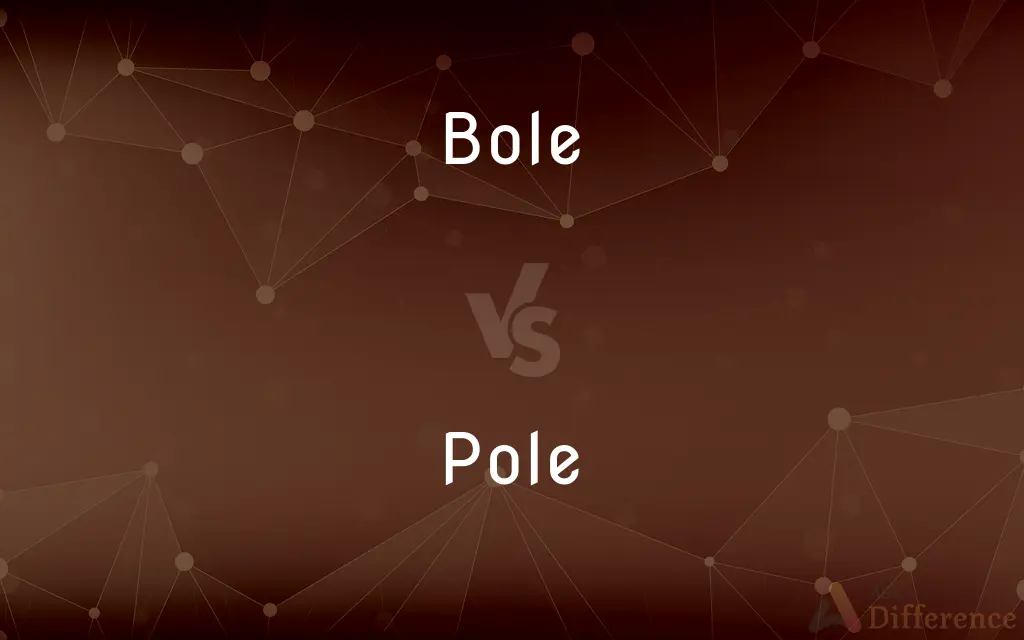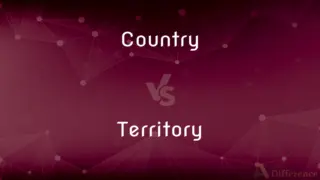Bole vs. Pole — What's the Difference?
By Tayyaba Rehman — Updated on August 19, 2023
Bole refers to the main trunk of a tree, while pole denotes a long, slender, usually rounded piece of wood or metal.

Difference Between Bole and Pole
Table of Contents
ADVERTISEMENT
Key Differences
Bole and pole, though phonetically similar, differ greatly in meaning and use. Bole refers to the trunk of a tree, especially when referring to its main shaft, minus the branches. It's the core part of a tree that supports its branches. On the other hand, pole is a long, slender piece of wood, metal, or another material, often used for support or as a tool.
In nature, you'll find boles wherever you see trees. A forest, for instance, would consist of numerous boles standing tall, supporting branches and leaves. Poles, conversely, are man-made or natural structures with a variety of purposes, ranging from being a part of a tent's support structure to utility poles carrying electrical wires.
When speaking about age or maturity, the bole of a tree provides an insight into the age of the tree. By counting its rings, one can estimate its age. Poles, in contrast, don't indicate age or growth in the same manner, but their condition can suggest how long they've been in use or exposed to elements.
From a tactile perspective, the bole, being a part of a tree, can have various textures, from rough to smooth, and often displays the natural patterns of the tree's bark. A pole, when crafted, is typically smoothed down and may be treated or painted, making its texture and appearance more uniform than that of a bole.
Aesthetically, boles play a significant role in landscapes, lending a sense of natural beauty and providing a habitat for various organisms. Poles, on the other hand, serve more functional purposes, though they can be incorporated into designs, such as in flagpoles or decorative structures.
ADVERTISEMENT
Comparison Chart
Definition
The main trunk of a tree.
A long, slender, usually rounded piece.
Origin
Natural
Can be natural or man-made.
Indication of Age
Through tree rings.
Condition can hint at duration of use.
Texture
Varies; from rough to smooth.
Typically smoothed, treated, or painted.
Primary Use
Natural support for branches.
Support, tool, or decorative structure.
Compare with Definitions
Bole
Bole refers to the part of a tree below the branches.
The bole's rough texture was an indication of its age.
Pole
Pole can refer to the opposite ends of a magnet.
The north pole of the magnet attracted the south pole of another.
Bole
Any of various soft fine clays, especially a reddish-brown variety used as a pigment.
Pole
Either of the regions contiguous to the extremities of the earth's rotational axis, the North Pole or the South Pole.
Bole
The trunk or stem of a tree.
Pole
One of two divergent or mutually exclusive opinions;
They are at opposite poles
They are poles apart
Bole
The main stem of a tree; usually covered with bark; the bole is usually the part that is commercially useful for lumber
Pole
To impel by a pole or poles, as a boat.
Bole
Bole is the shaft of a tree that provides support.
The tree's bole was thick and unyielding to the wind.
Pole
A contact on an electrical device (such as a battery) at which electric current enters or leaves
Bole
Bole can refer to the part of a tree used for timber.
The bole was chopped down to provide wood for construction.
Pole
One of two points of intersection of the Earth's axis and the celestial sphere
Bole
Bole is the main stem or trunk of a tree.
The bole of the ancient oak stood sturdy through centuries.
Pole
One of two antipodal points where the Earth's axis of rotation intersects the Earth's surface
Bole
The trunk of a tree.
Pole
Either extremity of an axis through a sphere.
Bole
A moderate reddish brown.
Pole
A square rod of land
Bole
Any of several varieties of friable earthy clay, usually coloured red by iron oxide, and composed essentially of hydrous silicates of alumina, or more rarely of magnesia.
Pole
(transitive) To convey on poles.
To pole hay into a barn
Bole
(colour) The shade of reddish brown which resembles this clay.
Pole
Pole denotes a position of extremity, often in opinions.
His views on the topic were completely pole apart from hers.
Bole
(obsolete) A bolus; a dose.
Pole
A measuring stick; also, a measure of length equal to 5 yards, or a square measure equal to 30 square yards; a rod; a perch.
Bole
The trunk or stem of a tree, or that which is like it.
Enormous elm-tree boles did stoop and lean.
Pole
The point on a nerve cell where a process originates.
Bole
An aperture, with a wooden shutter, in the wall of a house, for giving, occasionally, air or light; also, a small closet.
Open the bole wi'speed, that I may see if this be the right Lord Geraldin.
Pole
Either of two antithetical ideas, propensities, forces, or positions.
Bole
Any one of several varieties of friable earthy clay, usually colored more or less strongly red by oxide of iron, and used to color and adulterate various substances. It was formerly used in medicine. It is composed essentially of hydrous silicates of alumina, or more rarely of magnesia. See Clay, and Terra alba.
Pole
A fixed point of reference.
Bole
A bolus; a dose.
Pole
The origin in a polar coordinate system; the vertex of a polar angle.
Bole
A soft oily clay used as a pigment (especially a reddish brown pigment)
Pole
A point in the complex plane at which a given function is not defined.
Bole
A Chadic language spoken in northern Nigeria and closely related to Hausa
Pole
A long, relatively slender, generally rounded piece of wood or other material.
Bole
Bole is the central core of a tree.
Artists often find inspiration in the patterns on a bole.
Pole
The long tapering wooden shaft extending up from the front axle of a vehicle to the collars of the animals drawing it; a tongue.
Pole
To support (plants) with a pole.
Pole
To propel a boat or raft with a pole.
Pole
To use ski poles to maintain or gain speed.
Pole
Originally, a stick; now specifically, a long and slender piece of metal or (especially) wood, used for various construction or support purposes.
Pole
(transitive) To stir, as molten glass, with a pole.
Pole
To strike (the ball) very hard.
Pole
(transitive) To induce piezoelectricity in (a substance) by aligning the dipoles.
Pole
A native or inhabitant of Poland; a Polander.
Pole
A long, slender piece of wood; a tall, slender piece of timber; the stem of a small tree whose branches have been removed; as, specifically: (a) A carriage pole, a wooden bar extending from the front axle of a carriage between the wheel horses, by which the carriage is guided and held back. (b) A flag pole, a pole on which a flag is supported. (c) A Maypole. See Maypole. (d) A barber's pole, a pole painted in stripes, used as a sign by barbers and hairdressers. (e) A pole on which climbing beans, hops, or other vines, are trained.
Pole
Either extremity of an axis of a sphere; especially, one of the extremities of the earth's axis; as, the north pole.
Pole
A point upon the surface of a sphere equally distant from every part of the circumference of a great circle; or the point in which a diameter of the sphere perpendicular to the plane of such circle meets the surface. Such a point is called the pole of that circle; as, the pole of the horizon; the pole of the ecliptic; the pole of a given meridian.
Pole
To stir, as molten glass, with a pole.
Pole
A long fiberglass sports implement used for pole vaulting
Pole
One of the two ends of a magnet where the magnetism seems to be concentrated
Pole
Deoxidize molten metals by stirring them with a wooden pole
Pole
Pole is a long wooden or metal shaft used in various activities.
She vaulted over the bar using a flexible pole.
Pole
(Electricity) Either of two oppositely charged terminals, as in an electric cell or battery.
Pole
(Astronomy) See celestial pole.
Pole
Either extremity of the main axis of a nucleus, cell, or organism.
Pole
Either end of the spindle formed in a cell during mitosis.
Pole
A unit of area equal to a square rod.
Pole
(Sports) The inside position on the starting line of a racetrack
Qualified in the time trials to start on the pole.
Pole
A native or inhabitant of Poland.
Pole
A person of Polish ancestry.
Pole
To propel with a pole
Boatmen poling barges up a placid river.
Pole
To propel (oneself) or make (one's way) by the use of ski poles
"We ski through the glades on corn snow, then pole our way over a long one-hour runout to a road" (Frederick Selby).
Pole
To strike, poke, or stir with a pole.
Pole
A construction by which an animal is harnessed to a carriage.
Pole
(angling) A type of basic fishing rod.
Pole
A long sports implement used for pole-vaulting; now made of glassfiber or carbon fiber, formerly also metal, bamboo and wood have been used.
Pole
A telescope used to identify birds, aeroplanes or wildlife.
Pole
(historical) A unit of length, equal to a rod (4 chain or 2 yards).
Pole
(motor racing) Pole position.
Pole
A gun.
Pole
(vulgar) A penis
Pole
Either of the two points on the earth's surface around which it rotates; also, similar points on any other rotating object.
Pole
A point of magnetic focus, especially each of the two opposing such points of a magnet (designated north and south).
Pole
(geometry) A fixed point relative to other points or lines.
Pole
(electricity) A contact on an electrical device (such as a battery) at which electric current enters or leaves.
Pole
(complex analysis) For a meromorphic function , any point for which as .
The function has a single pole at .
Pole
(obsolete) The firmament; the sky.
Pole
Either of the states that characterize a bipolar disorder.
Pole
To propel by pushing with poles, to push with a pole.
Huck Finn poled that raft southward down the Mississippi because going northward against the current was too much work.
Pole
To identify something quite precisely using a telescope.
He poled off the serial of the Gulfstream to confirm its identity.
Pole
(transitive) To furnish with poles for support.
To pole beans or hops
Pole
One of the opposite or contrasted parts or directions in which a polar force is manifested; a point of maximum intensity of a force which has two such points, or which has polarity; as, the poles of a magnet; the north pole of a needle.
Pole
The firmament; the sky.
Shoots against the dusky pole.
Pole
To furnish with poles for support; as, to pole beans or hops.
Pole
To convey on poles; as, to pole hay into a barn.
Pole
A long (usually round) rod of wood or metal or plastic
Pole
A native or inhabitant of Poland
Pole
A linear measure of 16.5 feet
Pole
Propel with a pole;
Pole barges on the river
We went punting in Cambridge
Pole
Support on poles;
Pole climbing plants like beans
Pole
Pole is a long slender piece of material used as a support or tool.
He used a pole to pick the highest fruit.
Pole
Pole can also mean a long measuring rod.
The surveyor used a pole to measure the land.
Common Curiosities
Does the term bole only apply to living trees?
No, even after a tree is cut down, the main trunk or stem is still referred to as the bole.
Can a tree have more than one bole?
Yes, some trees, due to certain growth patterns or external influences, can develop multiple boles.
What is a bole in relation to trees?
Bole is the main trunk or stem of a tree, typically excluding the branches.
What does pole usually refer to?
Pole often refers to a long, slender piece of wood or metal used as a support, tool, or part of a structure.
Are flagpoles and fishing poles examples of the term "pole"?
Yes, both flagpoles and fishing poles are specific types of poles designed for particular purposes.
Is the bole of a tree usually above or below ground?
The bole is primarily above ground, though the base of the bole may merge with the tree's root system below ground.
Can pole refer to something other than a physical object?
Yes, in a metaphorical sense, pole can denote extremities in opinions, positions, or conditions.
Are boles used commercially?
Yes, the bole of a tree, being the main source of wood, is often used in timber and wood-based industries.
What's the connection between pole and magnetism?
In magnetism, poles refer to the two ends of a magnet, namely the north and south poles, which exhibit attraction or repulsion.
Is there any symbolic meaning to the word pole?
Yes, poles can symbolize direction, as in "north pole" and "south pole," or extremity, as in polar opposites.
Share Your Discovery

Previous Comparison
Country vs. Territory
Next Comparison
Nue vs. ManticoreAuthor Spotlight
Written by
Tayyaba RehmanTayyaba Rehman is a distinguished writer, currently serving as a primary contributor to askdifference.com. As a researcher in semantics and etymology, Tayyaba's passion for the complexity of languages and their distinctions has found a perfect home on the platform. Tayyaba delves into the intricacies of language, distinguishing between commonly confused words and phrases, thereby providing clarity for readers worldwide.
















































